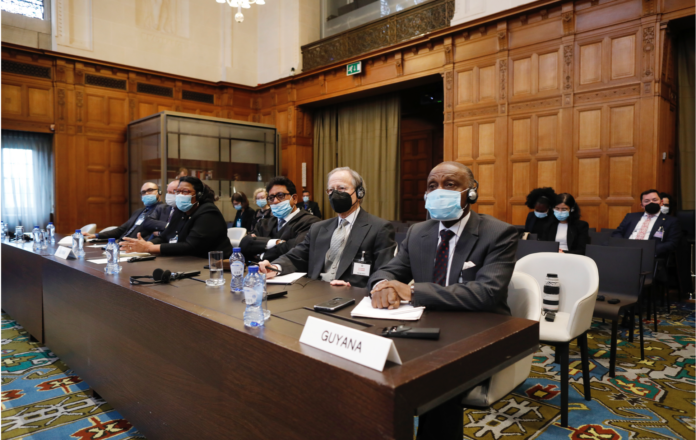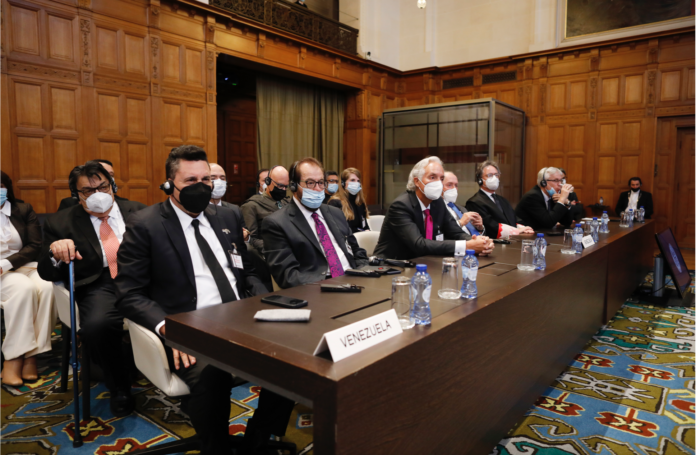By Roy Lie Atjam
The Hague, the International Court of Justice (ICJ) on Thursday 6 April 2023, delivered its judgment on the preliminary objection raised by Venezuela in the case concerning the Arbitral Award of October 3, 1899 with Guyana. The judges ruled they had jurisdiction over a long-running border dispute between Guyana and Venezuela. The ruling was read out by Judge Joan Donoghue, the President of the Court.
Venezuela contended the ICJ had no jurisdiction to hear the case and that the 1899 Arbitral Award was a complete, final and perfect settlement of the land boundary between the two countries because Britain was not a party to the proceedings.

In 2018 Guyana requested the ICJ, also known as the World Court, to confirm that the border was laid down in an 1899 arbitration between Venezuela and the then-colony of British Guiana.
The court by 14 votes to 1, rejects the preliminary objection raised by the Bolivarian Republic of Venezuela, said presiding judge Joan Donoghue, while reading the decision. What this means is that the Court can move forward with hearing the substantive case on its merits of whether the 1899 arbitral award settling the boundaries of Guyana and Venezuela is valid and binding. Decisions by the International Court of Justice are final and legally binding.
Colonial inheritance, Central- and South America have a history riddled with border disputes. Newly independent states inherited borders imposed by colonial powers. Disputes over territory developed, often leading to war. Things seem to improve, and conflict resolution is a new phenomenon.

Venezuela claims almost two-thirds of Guyana the country also has a border dispute with Suriname(1840) that escalated in 1969. Dr Eric Williams, PM of Trinidad and Tobago, mediated at the Chaguaramas conference(1970)
Guyana is pleased with the ruling and is looking at the future unfazed. There is a song by the Tradewinds-Dave Martins. Part of the lyrics is “not a blade of grass”, we are not giving up no mountain, no river, no tree, not a blade of grass. The Essequibo territory as we land ! The song is alluding to the claim by Venezuela they have nothing to get, not even a blade of grass!

Reaction from Venezuela on the ICJ ruling.
Vice President Delcy Rodríguez on the ICJ ruling: “Our arguments were heard. Venezuela is the only historical heir to the territory of Guayana Esequiba. Delcy Rodríguez, read a communiqué from the Government of Venezuela, where she ratifies her adherence to the Geneva Agreement signed in 1966 to settle the territorial dispute over the territory of Guayana Esequiba.
Delcy Rodríguez stressed that the country “does not recognize the ICJ judicial mechanism as a means of resolving the aforementioned controversy because it excludes the nature and purpose of this agreement.
The Geneva Agreement is the only valid and current instrument to resolve the dispute over the territory of Guayana Esequiba, through political negotiations for the sake of a practical and satisfactory solution for both parties. The Bolivarian Republic of Venezuela will exhaustively evaluate its implications and will adopt all the measures at its disposal to defend its legitimate rights and territorial integrity.”
It has been announced that in the coming days, the President of the Republic, Nicolás Maduro, will hold a large consultation on the implications of this incidental ruling. The future will tell the outcome of this ongoing dispute. Despite the ICJ ruling, it could take years for a final verdict.



